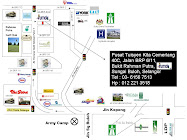The English Verb - Have
In all the simple tenses, the verb "have" can be used as the main verb
In all the perfect tenses the verb "have" is used as an auxiliary verb .
When the verb "have" is used as the main verb, it is usually used only in the simple form (static verbs).
The verb "have" can be used in the progressive tense, only in the present and future.
The verb have can not be used in the past progressive tenses.
Have as the Main Verb in Positive Sentences
Subject
Main Verb "Have"
Continue the Sentence
I have /had/will have a car.
We have /had/will have a lot of homework.
You have/had/will have a nice house.
The cars have/had/will have new tires.
Natalie has/had/will have a great time in the States.
Her father has/had/will have a very good job.
*have is used in the present simple tense.
*has is used in the past simple tense.
*will have is used in the future simple tense.
Have as the Main Verb in Negative
Subject Auxiliary verb Not Main Verb "Have" Continue the Sentence
I do/did/will not have time to visit him.
We do/did/will not have to cook dinner when I got home.
They do/did/will not have a lot of time to visit Mary.
The car does/did/will not have a new paint job.
Our teacher does/did/will not havea hard time teaching us.
My father does/did/will not have me spent a lot of money on candy.
*do is used in the Present Simple Tense with the following pronouns I. you, we, they, and plural
nouns.
*does is used in the Present Simple with the following pronouns he, she, it and plural
nouns. and uncountable nouns.
Question with the verb "have" as the main verb Wh - word (if needed)
Auxiliary Verb Subject Main Verb "Have"
Continue the Sentence
When do/did/will I havetime to visit him?
Do/Did/Will we have to cook dinner when we got home?
Why do/did/will they have little homework?
When does/did/will the car haveto get a new paint job?
Does/Did/Will our teacher have a hard time teaching us?.
Why does/did/will your father have so much candy in the car?.
skip to main |
skip to sidebar



pusattuisyenkitacemerlang@yahoo.com
We provide 1. Quality Teaching To Encourage Your Child's Learning Desire. 2. Quality Learning To Build Your Child's Self Confidence. 3.Quality Growing To Shape Your Child's Future. Email: pusattuisyenkitacemerlang@yahoo.com
Principal

Motivator and Academic Counselor

Location

pusattuisyenkitacemerlang@yahoo.com
Sharing Subjects
- Adat Melayu (6)
- B.Melayu - Karangan (1)
- KC 伟 杰 课 室 (25)
- KC 伟 杰 课 室 Proverb (17)
- KC 伟 杰 课 室 Reborn (15)
- KC 伟 杰 课 室- Travel (1)
- KC 伟 杰 课 室-出国留学 (14)
- KC 伟杰课室 - 教育 (10)
- KC 伟杰课室学习 (8)
- Kita Cemerlang (12)
- Kita Cemerlang - Sharing (106)
- Kita Cemerlang 雙溪毛糯- Work? (10)
- Komsas (6)
- Math Reference Tables (10)
- Maths Olympics (8)
- Photos (4)
- PMR - BM作文 (12)
- PMR - 华文 (17)
- PMR - 华文作文 (25)
- PMR - 英语 (1)
- PMR - 英语作文 (6)
- PMR-华语-孔子 (4)
- Science - Chemistry (9)
- SPM - B. M-Tatabahasa (2)
- SPM - BM作文 (20)
- SPM 华文 (4)
- SPM 华文作文 (3)
- STPM 华文 (4)
- STPM 华文作文 (1)
- Teacher (7)
- UPSR - 华语 (2)
- UPSR - 华语作文 (54)
- UPSR - 成语故事 (9)
- UPSR B.English (13)
- UPSR B.English - Grammar (28)
- UPSR B.English - Story (7)
- UPSR B.English Essay (16)
- UPSR B.M- Nilai Murni (5)
- UPSR B.Melayu (3)
- UPSR B.Melayu - Karangan (15)
- UPSR B.Melayu - Tatabahasa (20)
- UPSR Mathematic (11)
- UPSR- 华语 (39)
- UPSR- 华语古文 (21)
- UPSR- 科学 (17)